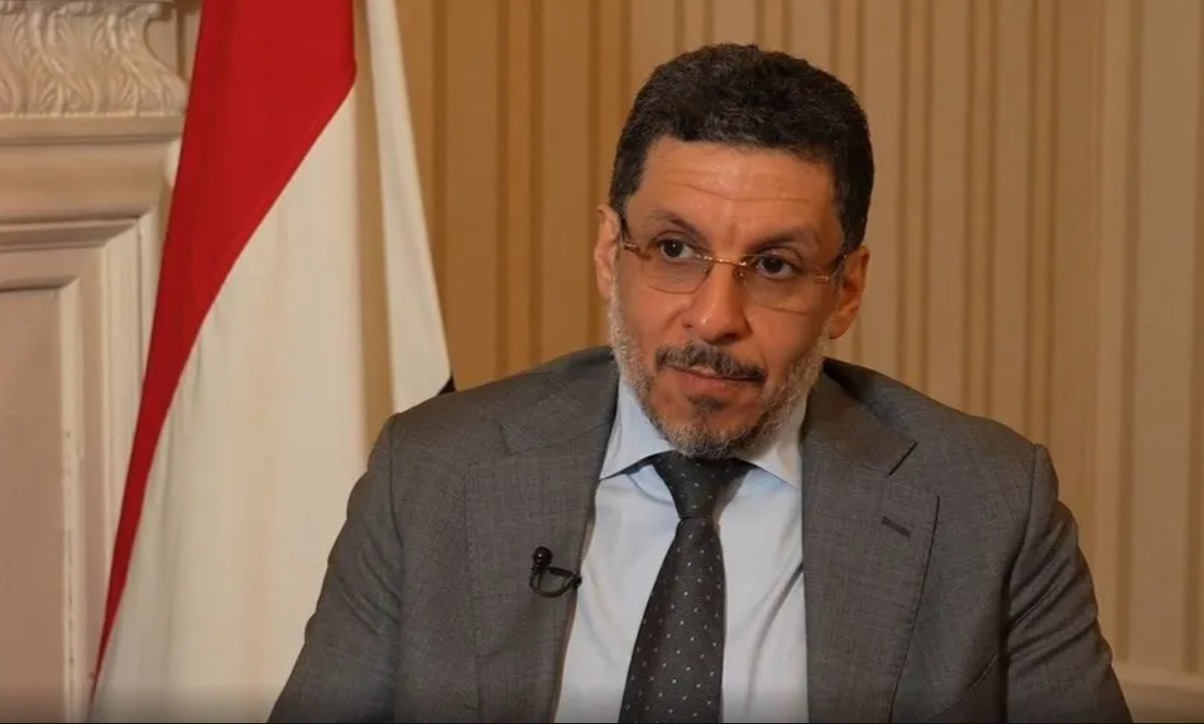


Barran Press
Yemeni Prime Minister Ahmed bin Mubarak said on Wednesday that "peace opportunities have diminished" due to the actions of the internationally designated terrorist group Houthi militia, and that the world is now looking with great suspicion at the role that the Houthis could play in any future peace formula.
In an interview with Asharq Al-Awsat newspaper, bin Mubarak added that "there has been a strategic shift like the Western view of the Houthis as representing an ideological threat, and the nature of this ideology and its impact not only on Yemen but also on the region and the world."
He pointed out that "the presence of the Yemeni government on the ground and its increased empowerment with its sovereign tools and the practice of sovereignty on its land is one of the important issues that are being worked on."
On his recent visit to Britain, bin Mubarak explained that, in addition to "discussing many bilateral issues, and other matters including the Red Sea, which is one of the hot files these days," the budget between what is provided in Yemen as humanitarian aid was discussed, along with the important development aspects, and opening up horizons for bilateral cooperation, especially in the investment field, in sectors such as energy or oil with the British government.
The Yemeni Prime Minister spoke to the newspaper about the importance of the existence of the Presidential Leadership Council, because it represents all the forces that were fighting before the formation of the council, considering its placement in one entity a very big step forward.
The Prime Minister acknowledges the existence of challenges, whether internal or external and believes that they cannot be achieved without a complementary role between the Leadership Council and the government, noting that he "came in difficult circumstances in light of the halt in oil exports, which deprived the Yemeni government of more than 70 percent of its resources."
Regarding the electricity tragedy, the Yemeni Prime Minister confirmed that "this sector has suffered in the past period for many reasons, and there has been an absence of strategic dealing with this file for a long time, and there was a great reliance on partial solutions."
He spoke about the government's strategy in this regard, which focuses first on stopping the bleeding and achieving abundance that can enable investments in the medium and long term, adding that "the electricity sector needs time to repair it, large investments and real partnership with the private sector."
100 Days of Achievements
When asked how the first hundred days of his new mission went, the Prime Minister replied: "It was certainly difficult; because the circumstances are difficult, and you know that I came amid the halt in oil exports, and this deprived the Yemeni government of more than 70 percent of its resources under the main title of the war, which is the economic war, whether by preventing the movement of goods from government-controlled areas to Houthi-controlled areas, and depriving the government of many resources and preventing the export of domestic gas from Marib, and preventing the export of oil, and all this created a real economic war directed towards the Yemeni government."
The other thing, according to the Prime Minister, "there are general suggestions that we are living in a stage of peace, and we have had more than 48 martyrs in the past week as a result of confrontations with the Houthis, in addition to the difficulties related to institution-building, from which the Yemeni government suffers as a result of the direct war conditions. And thus, there were many challenges that I faced as Prime Minister."
On the other hand, bin Mubarak saw that there was a lot that was achieved during this period: "I came with main titles, I came with the issue of reform, more transparency and disclosure, and more direct relationships with the ordinary people in the street, and other main paths that focused on the best use of resources; for spending and working to increase non-oil resources, financial and administrative reform of the main state institutions, a presence for all institutions and their activation through the temporary capital Aden, and the best use of international aid and announcements."
He continued: "Despite the difficulty, energy and fuel alone have achieved several achievements and issues through the activation of tender committees, we only in the field of fuel that is spent on energy will be a reduction of more than 35 to 40 percent, which was previously spent through transparent procedures and tenders, and this will have an impact in the medium term."
He added: "There are also several measures that have been taken and have helped to redevelop revenues, and there is a general plan for this matter." He spoke about "retightening the state apparatus, and there is a presence - I can say it is very large - for all state institutions and their reactivation from the (temporary) capital Aden."